Bibisara Assaubayeva defied the odds and secured a remarkable victory against Polina Shuvalova, despite initially facing an uphill battle. The three other games ended in a draw
As the Women’s Grand Prix tournament in New Delhi reached its halfway point, Round Six brought an electrifying array of games to the forefront. With all four boards featuring sharp and skilful play, it’s a surprise that just one game finished with a decisive result.
Round 6 results:
Kateryna Lagno – Nino Bastiashvili, ½ – ½
Aleksandra Goryachkina – Vaishali Rameshbabu, ½ – ½
Polina Shuvalova – Bibisara Assaubayeva, 0 – 1
Zhu Jiner – Nana Dzagnidze, ½ – ½
Bibisara Assaubayeva is the biggest winner of the day overturning a lost position against Polina Shuvalova. Assaubayeva got into trouble early on, after forgetting the opening. Shuvalova missed several good chances to seal the victory and, in the end, lost.
Assaubayeva is the only player in New Delhi who had decisive results in all of her games so far.
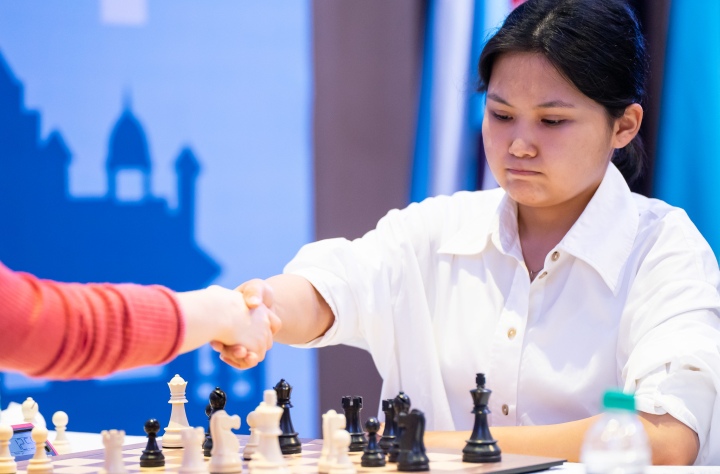
In a second surprise of the day, Zhu dropped a huge advantage against Nana Dzagnidze following Black’s misplay in the Najdorf.
Despite achieving better positions, Kateryna Lagno and Aleksandra Goryachkina could not find the right way forward and ended up drawing their games.
Zhu Jiner and Bibisara Assaubayeva are now joint leaders with four points, though the latter has played one game less.
Here follows a more detailed look at the games of Round Six.
Kateryna Lagno – Nino Batsiashvili
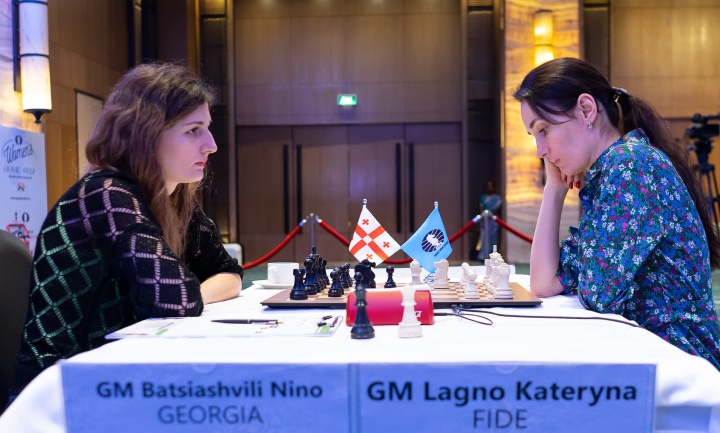
Out of four games the two have played until New Delhi, Lagno won three and Batsiashvili one.
In a rare line of the Archangel variation in the Ruy Lopez, Nino seemed to be uncomfortable. Lagno went for a strike in the centre with 8.d4 and got the upper hand.
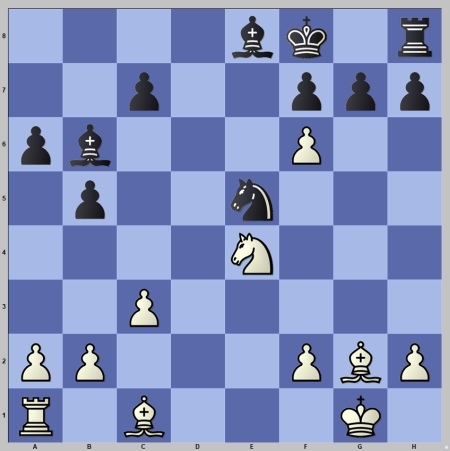
However, Kateryna couldn’t find the best way forward and started spending significantly more time. Instead of 18.Bf4, attacking the e5 knight and opening the path for the a1 rook to get involved in the game, White went with 18.Bg5. Batsiashvili responded resourcefully, exchanging her passive pieces for White’s attacking pieces, erasing White’s advantage.
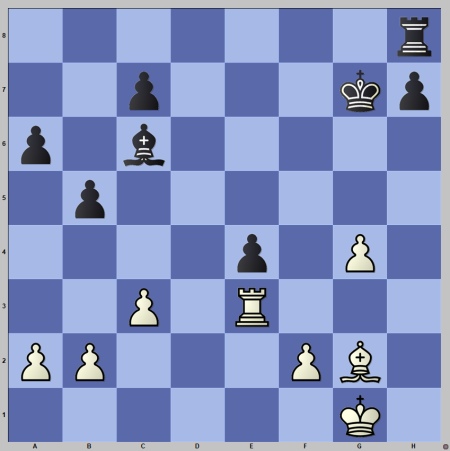
After exchanges and simplifications, this was now an even rook and bishop endgame. It did not take too long for the opponents to shake hands and split a point, right after reaching the time control.
The two players spent some time after the game discussing and analysing the positions. In the post-game interview, Lagno pointed out that Batsiashvili did not know the opening line well. “I had a better position but I couldn’t find the right way forward,” Lagno said.

Kateryna Lagno now has 2,5 points out of five games, while Batsiashvili is on 1,5.
Aleksandra Goryachkina – Vaishali Rameshbabu
Goryachkina and Vaishali have played seven games so far. Somewhat surprisingly, the young rising star from India leads with three victories and four draws against the current World number two player!
Their eighth game saw a popular line of the Gruenfeld Defence, extensively tested on the highest level. The opponents followed the encounter between Anish Giri and Ding Liren up to move 17 when the Indian deviated with 17…f6 and grabbed White’s e4-pawn.
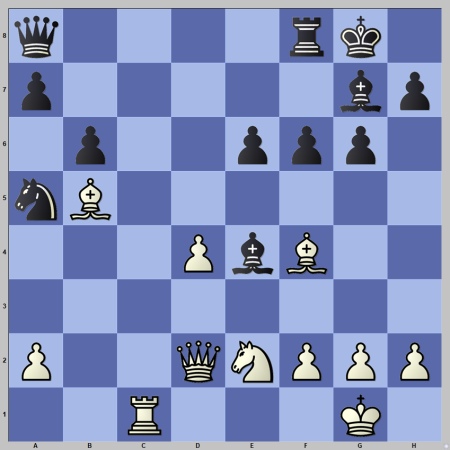
Aleksandra got more than sufficient compensation but stumbled at a critical moment. Goryachkina spent nearly 40 minutes(!) thinking but instead of 20.Bd7 followed by 21.Rc7 with considerable pressure, she played 21.Qe3, which wasn’t the best choice. This allowed Black to relieve the tension with a timely 20…e5 and activate her pieces, leading to an even position.
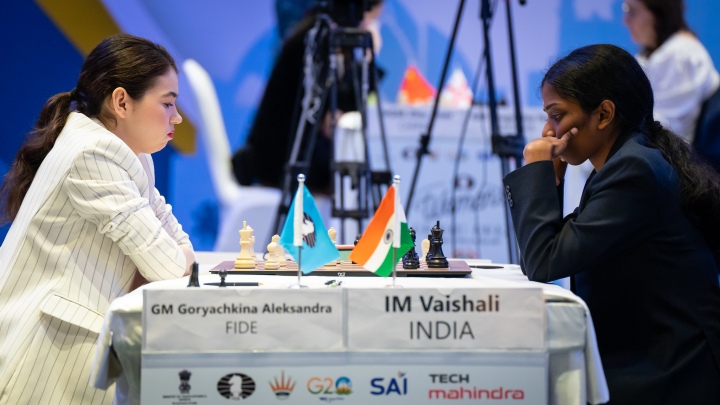
The two played on, but the evaluation of the position was not changing: White had sufficient compensation for a pawn but hardly more. A draw by perpetual came as a logical outcome. In a post-game interview, Goryachkina said that she felt that she was better but that she couldn’t find the right move forward.
Goryachkina now has 2,5 points out of four games played, while Vaishali has one point with the same number of games.
Polina Shuvalova – Bibisara Assaubayeva
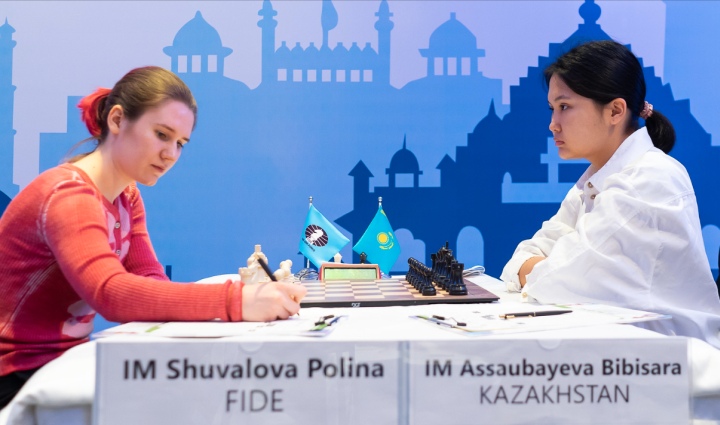
Facing the King’s Indian Defence on the white side, Shuvalova opted for a very sharp Four pawns attack and, after advancing her kingside and central pawns, got a clear advantage.
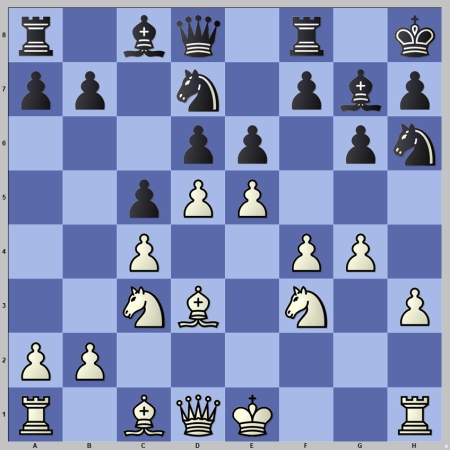
Still, White had to put her king to safety – 12.0-0, which was the most natural and strong continuation. After 12.exd6 Nb6 White was still better, but overambitious 13.f5 led to an unclear position.
Bibisara immediately returned the favour by 13…exd5 and after 14.Bf4 Nc4 15.Bxc4 dxc4 White was in command again.
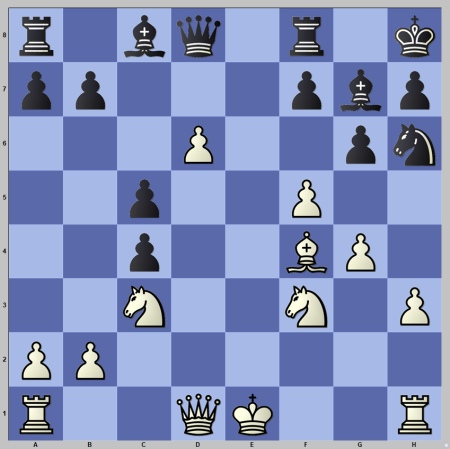
However, instead of natural 16.Qd2 Ng8 17.0-0-0 with a crushing attack, Polina played 16.f6? giving up a pawn and dropping her advantage. Black’s reaction was far from optimal, and Polina obtained a decisive advantage one more time.
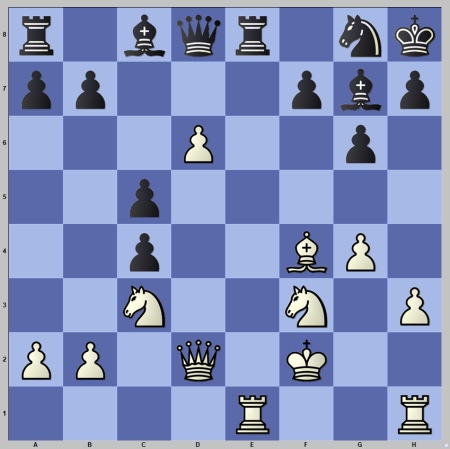
The pendulum kept swinging as Shuvalova missed another opportunity to seal the deal. Instead of 20.Nd5 (or 20.Rxe8 Qxe8 21.Nd5) she opted for 20.Ng5? and after 20…Rf8 21.Qd5, the position was equal.
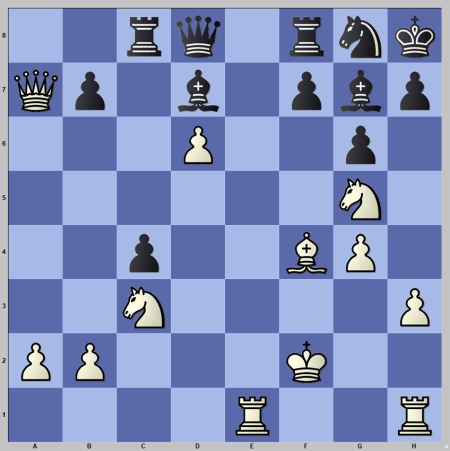
White’s woes did not end there. Black already achieved some counter-play in a roughly even position, but here Polina made a step into the abyss: 24.Kg3?? After 24…Bb7 25.Rh2 h6 26.h4 Qd7 27.Nce4 h5 Black was completely winning. Three moves later, Shuvalova threw in the towel.
A great misfortune for Polina Shuvalova, and a lucky break for Bibisara Assaubayeva.
Assaubayeva now has four points out of five games, while Shuvalova is on 2,5 and is bye on day seven.
Zhu Jiner – Nana Dzagnidze
Up to this round, Zhu has one victory and two draws with Nana Dzagnidze.
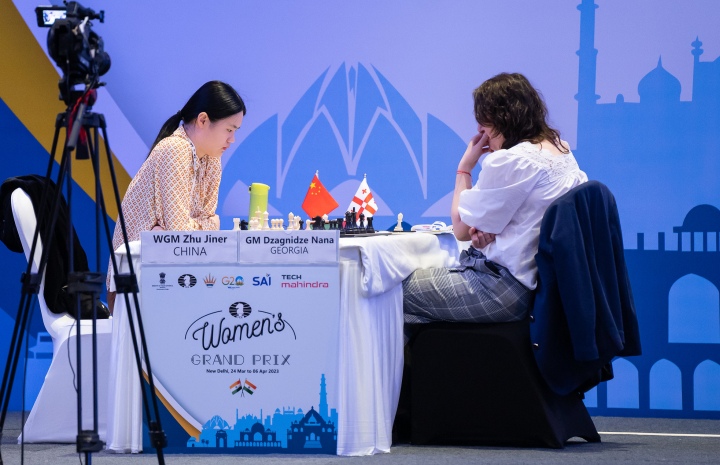
The opponents tested a very sharp line of the Najdorf Sicilian, in which White missed a chance to sacrifice a piece for a dangerous initiative
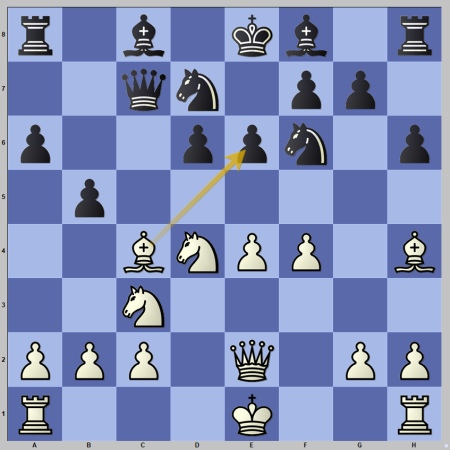
Zhu opted for 11.Bb3, but a stronger move was 11.Bxe6 fxe6 12.Nxe6 with excellent positional compensation and continuous pressure. The Chinese player went for a more cautious approach and still came out with a preferable position.
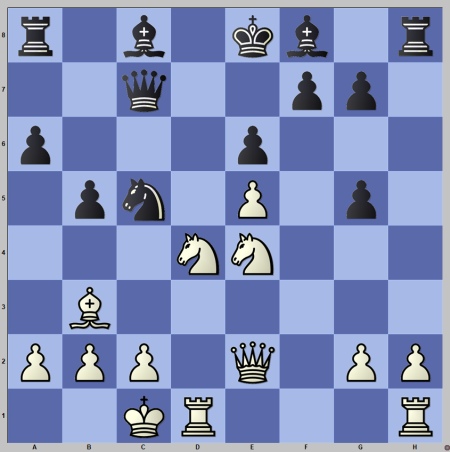
White is better: she has two strong knights in the centre, threatening to take on g5 and then press on the f7 and d8 squares, endangering Black’s weak king. Dzagnidze’s best option was to play 16…Be7 to guard the d8-square and try and move her king to safety. Instead, she blundered with 16…Nxb3? After 17.axb3, there is no escape for Black.
However, at this point, the Chinese player lost the thread: after 17…Be7, Zhu played 18.Nd6 immediately, instead of increasing pressure with 18.Rhf1. After 18…Bxd6 19.exd6 Qxd6 White is still much better, but instead of 20.Nxb5, she erred with 20.Nxe6?. As a result, White’s advantage completely melted.
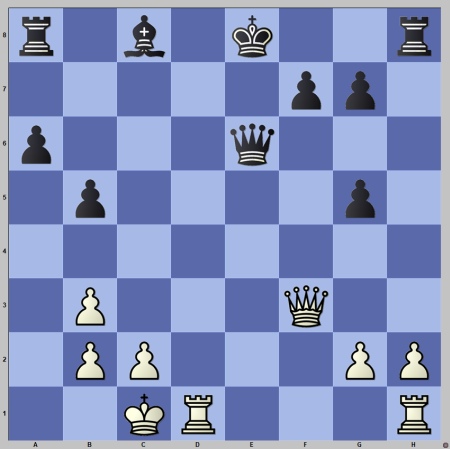
Nana found the resourceful move 22…Bb7! returning material but securing her king and reaching an equal position. Eleven moves down the road, a draw was agreed upon.
A missed chance for Zhu and a lucky break for Dzagnidze. Zhu now has four points, while Dzagnidze has two out of six.
Standings after Round 6:
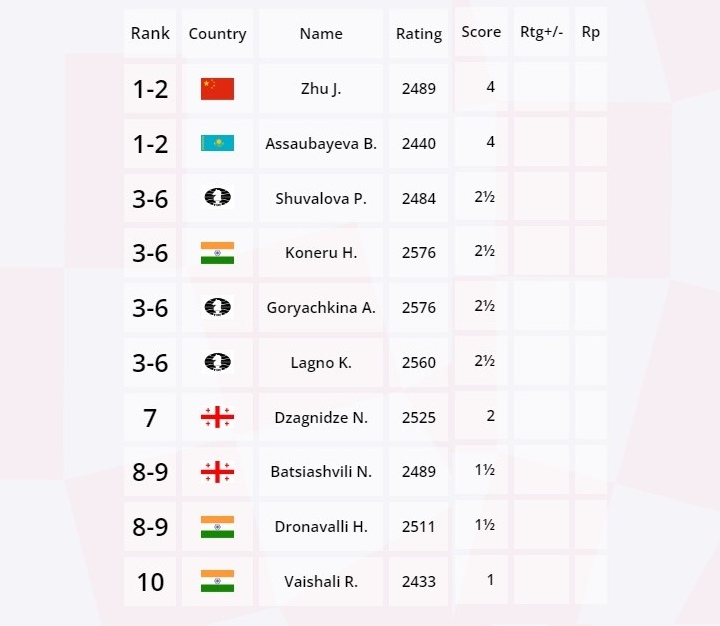
The seventh round of the third leg of the Women’s Grand Prix will take place on Saturday, 1st April at 3 PM local time.
Round 7 pairings:
Nana Dzagnidze – Kateryna Lagno
Bibisara Assaubayeva – Humpy Koneru
Vaishali Rameshbabu – Harika Dronavalli
Nino Batsiashvili – Aleksandra Goryachkina
Zhu Jiner and Polina Shuvalova have a rest day.
Text: Milan Dinic
Photo: Ismael Nieto
About the Women’s Grand Prix
The FIDE Women’s Grand Prix consists of four tournaments played between September 2022 and May 2023 and includes 16 women players who take part in three of the four tournaments. The two players who score the greatest number of cumulative points in the series shall qualify for the FIDE Women Candidates Tournament 2023-24.
The players participating in the Women’s Grand Prix have been selected based on their performance in key FIDE events and their ELO. Also, each of the four local tournament organisers has a right to nominate a player of their choice.
The time control for the tournament is 90 minutes for the first 40 moves, followed by 30 minutes for the rest of the game with an increment of 30 seconds per move starting from move one.
The total prize fund for each one of the four events is €80,000, with another €80,000 being distributed among the top eight players in the overall standings for the Grand Prix series.
General information about the venue and the dates
The third leg of the Women’s Grand Prix will take place in New Delhi’s Leela Ambience Convention Hotel. The five-star hotel is designed to cater to business events and large meetings and should make an ideal place for a tournament of this level.
The rounds will be played each day from 3 PM local time (9.30 GMT).
For more information about the event, visit https://womengrandprix.fide.com/.

